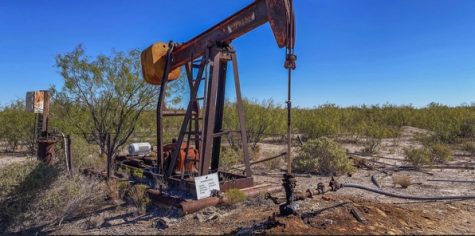Accountability Now: Texas and Oil Make Hazardous Bedfellows

Christi Craddick, Jim Wright, and Wayne Christian—these three individuals form an unholy triumvirate that sits upon hundreds of thousands of dollars contributed by a handful of oil and gas interests, and by pure coincidence, Christian, Wright, and Craddick also hold power over the highest oil regulatory body in the state of Texas. Such serendipity should not go unnoticed.
 Solely in terms of campaign contributions, these three have collectively accumulated nearly one million dollars from executives, political action committees, and limited liability corporations and partnerships with ties to the oil and natural gas industry in Texas, comprising approximately 77% of all campaign contributions. Such figures are, in all likelihood, still a gross underestimation of the impact and grip that the oil industry holds on the Railroad Commission, as such a number still omits various donors who have ties with investment firms or construction companies that, in all likelihood, would benefit to more laissez-faire oil regulatory policies. Going further, 71.3% of all of the contributions made to Christi Craddick, the chairwoman of the Railroad Commission, have been from oil interests. Not to mention, many of these donors spend hundreds of thousands of dollars more on candidates such as Greg Abbott, who, in particular, holds the power to appoint individuals to the Public Utility Commission of Texas.
Solely in terms of campaign contributions, these three have collectively accumulated nearly one million dollars from executives, political action committees, and limited liability corporations and partnerships with ties to the oil and natural gas industry in Texas, comprising approximately 77% of all campaign contributions. Such figures are, in all likelihood, still a gross underestimation of the impact and grip that the oil industry holds on the Railroad Commission, as such a number still omits various donors who have ties with investment firms or construction companies that, in all likelihood, would benefit to more laissez-faire oil regulatory policies. Going further, 71.3% of all of the contributions made to Christi Craddick, the chairwoman of the Railroad Commission, have been from oil interests. Not to mention, many of these donors spend hundreds of thousands of dollars more on candidates such as Greg Abbott, who, in particular, holds the power to appoint individuals to the Public Utility Commission of Texas.
Certainly, it may be perceived that these aforementioned governmental bodies, namely the Railroad Commission (RRC) and Public Utilities Commission (PUC), are nothing more than bureaucratic entities that are merely relevant to lawyers and nosy highschoolers. However, this blatant cronyism which has been detailed has already led to dire consequences—mainly the winter storm catastrophe, which could have been mitigated if it weren’t for both the PUC’s and RRC’s inaction. More recently, the Railroad Commission has been faced with increased seismic activity within the Permian Basin. In response, the RRC has put restrictions on 76 saltwater injection wells. For reference, there are 26,100 saltwater injections currently operating in Texas, demonstrating the lukewarm response to an activity that has proved to be hazardous both in this case. Not to mention, these restrictions will only last for a year. Considering that the practice of saltwater injection and disposal poses a sizable risk of contaminating groundwater (a danger that could affect the health of countless Texans), these earthquakes were a warning shot that the RRC decided to blatantly ignore. Perhaps, such willful ignorance was brought on by the fact that NGL Water Solutions Permian LLC, a company that specializes in saltwater injections and disposal, donated a collective $75,000 to the standing commissioners? One may never know.
 Now, it might cross one’s mind that if this situation was truly a problem, Texans would have already mounted a campaign to depose these individuals from office before their eventual election. Albeit a very tempting argument, such a line of reasoning fails to account for the fact that, these candidates, at times, have campaigning budgets 100 times greater than that of their opponents, wedging a sizeable gap between the will of the people and the financial means to achieve it.
Now, it might cross one’s mind that if this situation was truly a problem, Texans would have already mounted a campaign to depose these individuals from office before their eventual election. Albeit a very tempting argument, such a line of reasoning fails to account for the fact that, these candidates, at times, have campaigning budgets 100 times greater than that of their opponents, wedging a sizeable gap between the will of the people and the financial means to achieve it.
Thus follows that the only way to rectify such an injustice that has, without exaggeration, already led to the deaths of hundreds is to reform Texas Election Code Chapter 253 which, as of now, puts no limitations on political spending by individuals and limited liabilities for a specific candidate or PAC. Even a gratuitous cap of $5,000 per candidate would greatly level the playing field for candidates that fall short of worshipping at the temple of petroleum. Additionally, if one wanted to be so radical as to reform Texas Government Code Chapter 572, we, as Texans, could compel commissioners to recuse themselves from administrative decisions in which deal with a party that has either made campaign contributions to a commissioner or that a commissioner has personally invested in.
 Provided that the Texas Legislature has been anything but inactive, it certainly would be satisfying to see drastic change being taken to tackle an immediate and pressing matter that very much undermines the democratic process as a whole. Personally, I’d like just as much of a say in government as Valero or Marathon, and I don’t find that opinion to be held by a minority.
Provided that the Texas Legislature has been anything but inactive, it certainly would be satisfying to see drastic change being taken to tackle an immediate and pressing matter that very much undermines the democratic process as a whole. Personally, I’d like just as much of a say in government as Valero or Marathon, and I don’t find that opinion to be held by a minority.

Jack Dougherty is a senior at Keystone who enjoys participating in Model UN and Academic Worldquest and has lately found himself in the midst of helping...
